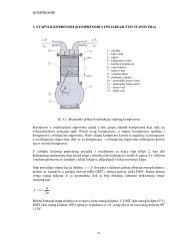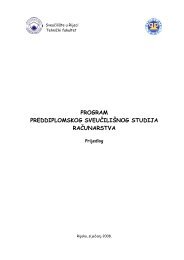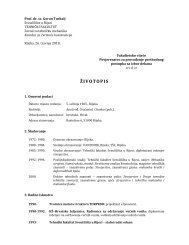universityâenterprise cooperation
universityâenterprise cooperation
universityâenterprise cooperation
You also want an ePaper? Increase the reach of your titles
YUMPU automatically turns print PDFs into web optimized ePapers that Google loves.
38, 52, 57, 66, 88], performed by consortium<br />
members involved in development of<br />
new regional model and preparation of this<br />
publication, following summarized problems<br />
and needs have been perceived, in the areas<br />
of education, research and innovation, as<br />
well as SME potential and their needs,<br />
relevant for the WBC-VMnet project and its<br />
aim to integrate knowledge triangle:<br />
a) University-enterprise <strong>cooperation</strong><br />
• There is the lack of effective linkages<br />
between knowledge institutions (HE<br />
and R&D) and industry. Although<br />
universities and enterprises have policy<br />
in their mission statements that mention<br />
the need to cooperate, efficient legal<br />
and policy arrangements that provide a<br />
sound and supportive environment for<br />
university–enterprise <strong>cooperation</strong> do<br />
not yet seem to have been established;<br />
• Universities find it difficult to attract<br />
social partners (Chambers of Commerce,<br />
Regional Development Agencies…), who<br />
do not consider university–enterprise<br />
<strong>cooperation</strong> as part of their portfolio;<br />
• There is little awareness of the mutual<br />
benefits of <strong>cooperation</strong> with industry;<br />
• Actual <strong>cooperation</strong> between university and<br />
industry takes place with large companies –<br />
often branches of multinationals, because<br />
these have a critical mass of qualified staff<br />
who can find a common language with<br />
teachers and researchers, they have better<br />
equipment and infrastructure, longer-term<br />
strategies and more money;<br />
• Despite of fact that universities consider<br />
SMEs to be the most relevant and interested<br />
partners for <strong>cooperation</strong> (98,9% of regional<br />
enterprises are SME), <strong>cooperation</strong> with them<br />
is not so active since they tend not to have<br />
the same long-term perspective, usually look<br />
for immediate practical solutions and provide<br />
low financial rewards.<br />
b) Higher education and training for SMEs<br />
• Universities are focused on academic<br />
knowledge, since curricula are so much<br />
theoretical and insufficiently oriented towards<br />
59<br />
In the current Tempus partner countries, as elsewhere in the world, enterprises need graduates<br />
who can combine good professional knowledge with the social skills that are required in a<br />
professional environment. Companies often complain that university curricula are too theoretical,<br />
too academic and insufficiently oriented towards professional practice and experience. They<br />
look for graduates with good life skills, such as communication skills, team-working abilities,<br />
leadership skills, reliability, creativity, commitment, problem-solving skills, negotiation and<br />
decision-making skills, independent learning skills and flexibility. Closer <strong>cooperation</strong> between<br />
universities and enterprises can help students to develop these skills.<br />
Enterprises want short-term success on the market and are open to <strong>cooperation</strong> with universities<br />
in order to have access to potential future employees. They are also interested in know-how and<br />
expert knowledge on innovative products and processes. Universities are much more oriented<br />
to the long term, and are interested in innovative teaching and research in general. They have<br />
little entrepreneurial spirit, as their institutional environment does not require it.<br />
Major drivers for university–enterprise <strong>cooperation</strong> include the need to transfer knowledge and<br />
technology and the need to recruit adequate human resources to be competitive and innovative<br />
in a global economy. The joint development of education and training for the labour market –<br />
promoting employability – is of common interest.<br />
Despite efforts to formalize relationships, personal contacts rather than institutional policies seem to<br />
have been the best guarantee for success and sustainability of projects up to now. Cooperation has<br />
had little impact on the institution as a whole. There are few support structures and platforms,<br />
and little dissemination of good practice for <strong>cooperation</strong> between universities and enterprises.<br />
Linking the worlds of work and education through Tempus;<br />
European Commission Directorate - General Education and Culture,<br />
European Communities, 2007;<br />
ISBN: 978-92-9157-486-5<br />
Current state in the WBC region 4
















